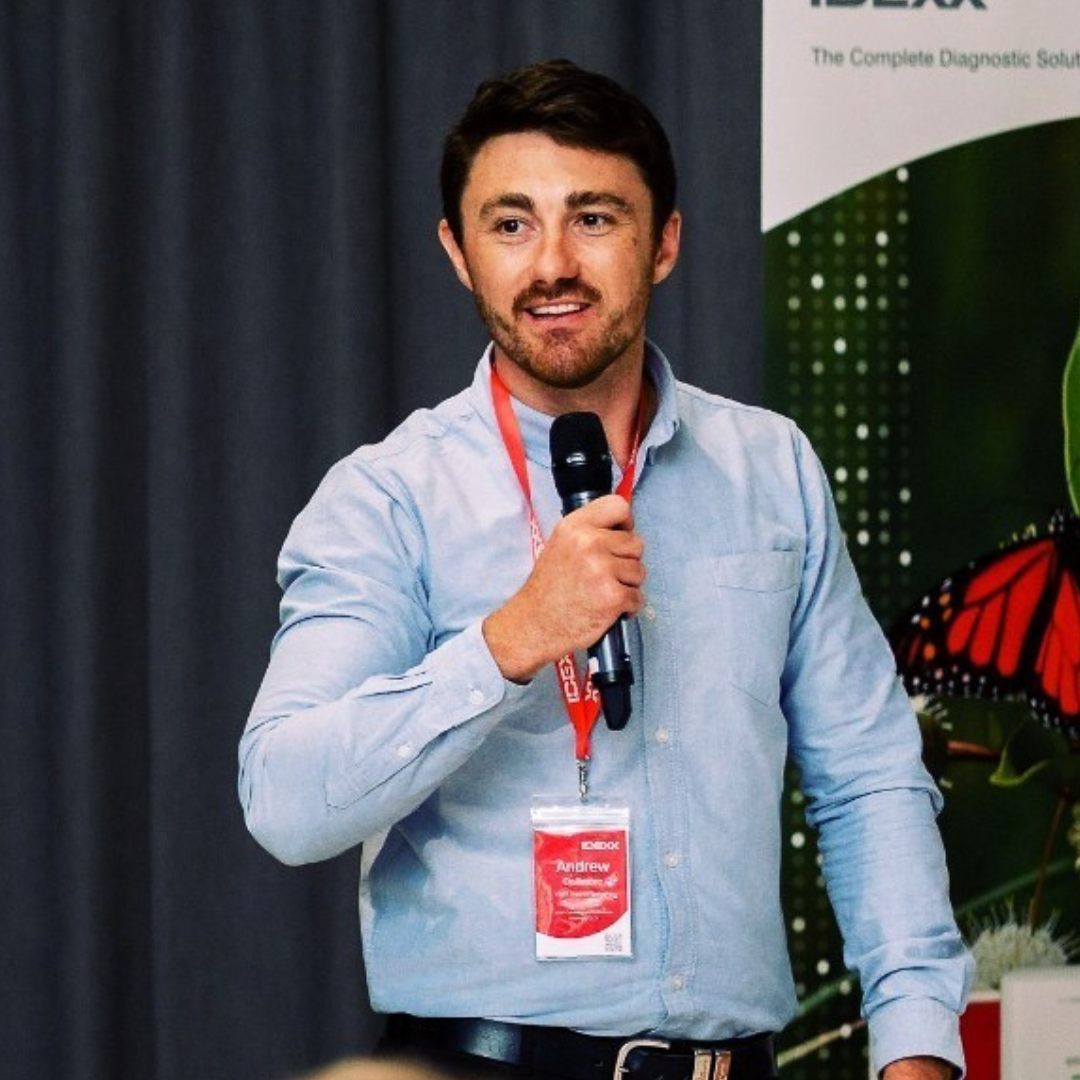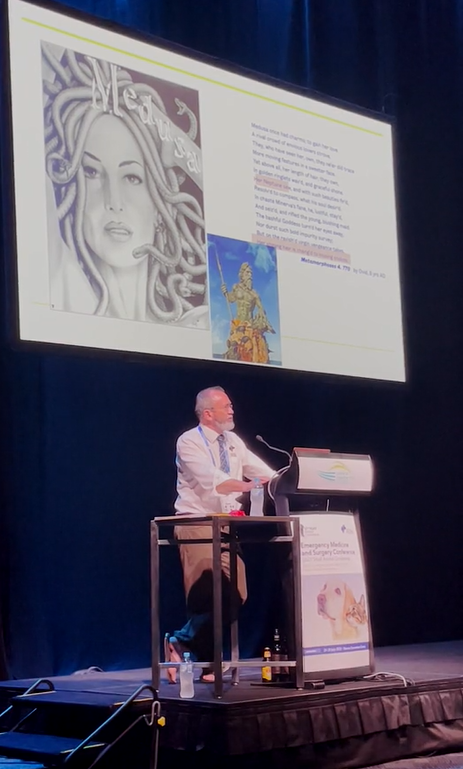Veterinary scene Down Under: Well-being consultant, plus management of mythical creatures
The veterinary consultant helping improve practice workflow and well-being; and a vet who’s attempting to educate on the veterinary management of mythical creatures
Veterinary well-being consultant
Dr Andrew Dallimore, veterinary business consultant at Restoravet.

Mental health is an important focus of the veterinary profession around the globe, with workplace well-being crucial to both individual team members and a successful practice. Andrew Dallimore, DVM, BMSc, has always been a passionate advocate of veterinary well-being. In that vein, he’s recently set up a consultancy, Restoravet, to work in-clinic with veterinary teams to help them achieve positive well-being while also reviewing and improving practice workflows.
“Veterinary ‘well-being’ is a term that’s thrown around a lot, but it’s an extraordinarily important part of any care-based industry,” Dallimore told dvm360®. “When we are run-down, our patients don’t get our best selves. The cascading effects from this are monumental. Not just for our own mental health and well-being, but also for the well-being of the business.”
“As a consultant, I’m working with veterinary teams to help them get to the root of what might be having a negative effect on their well-being, as well as any clinic workflow issues.”
Dallimore offers several consultancy options for practices as well as flexible packages to meet individual team and business needs. He can assess and review particular workflows from beginning to end; work in-clinic for a day or two or even for several months; conduct anonymous staff well-being interviews, and fundamentally act as a conduit between a business and team with their leaders.
Dallimore’s diverse career has seen him serve in cattle practice, small animal associate work, and practice group management, both in veterinary relief and in lead veterinarian positions.
“I’ve also previously worked as a veterinarian for two different practices to help fix cultural and sustainability issues, along with lecturing at the University of Adelaide [in Australia] in life skills for new graduates. I even helped set up an online veterinary business learning platform with the University of Adelaide School of Animal and Veterinary Sciences,” said Dallimore.
Through his diverse experience both within and outside of the profession, Dallimore is skilled in identifying the critical synergies between workflow efficiency and well-being for vet practices. He has also seen how negative workflows and well-being experiences can drive new and old team members away from the business.
In addition to his consultancy, Dallimore also mentors undergraduate veterinary students, new graduate veterinarians, veterinary nurses, and practice managers.
“Sometimes our best efforts just aren't enough, and that’s OK,” said Dallimore. “It’s OK to ask for help, and you are in no way failing by doing this. Whether it’s assistance with our mental well-being or our business well-being, we all have a right to get help, and to look forward to caring for animals every day we get up for work.”
Veterinary management of mythical creatures
Dr David Neck presenting on mythical creatures.

With all of the different facets of veterinary medicine and surgery covered in terms of knowledgeable specialists, topical experts, and well-referenced textbooks, Australian veterinarian David Neck, BSc, BVMS, MANZCVS, FAVA, decided to find a niche in which he could become a world expert. He landed upon educating others on the veterinary management of mythical creatures.
“All veterinarians would be familiar with the big veterinary names behind the common veterinary textbooks, who we automatically associate with that discipline, such as Stephen Ettinger owning the discipline of internal medicine or Donald Plumb being the go-to on veterinary drugs. I wanted my name to be linked to 1 topic like that,” said Neck to dvm360®. “But all the good topics were taken, so I had to invent my own.”
The mythological creatures for which Neck espouses veterinary treatment tips and anecdotes include dragons, centaurs, unicorns, and the wily Medusa, the most famous of the monster figures in Greek mythology, known as Gorgons.
“Most of us know that Perseus chopped off Medusa’s snake-covered head by looking in a mirror. But most probably don’t know that at the time she was pregnant by Poseidon, and when her blood spilled on the ground, the winged horse Pegasus popped out, along with its twin, Chrysaor,” explained Neck.
“Now, it would be easy enough to do surgery on Medusa’s snakes in a mirror—surgery has been done in mirrors before; a Russian surgeon in Antarctica took out his own appendix—but all caution must be taken to prevent any blood touching the ground or else you’ll have a winged horse bouncing around the operating theater.”
Drawing on his decades of clinical veterinary experience, the majority of which has been spent as owner of beachside Cottesloe Vet in Perth, Neck also shared some veterinary insights into the maladies of oceanic mythological creatures, including ichthyosis in mermaids and the gastrointestinal issues of the Kraken.
“It turns out that the Kraken probably has diarrhea for about 6 months of the year, and given its size, there’s only enough chloramphenicol on planet Earth to treat it for about 7 days. Therefore, another solution for chronic diarrhea might be oral-activated charcoal, and we would need a dose of about 3.5 shipping containers of activated charcoal per day to treat it. Given the greenhouse gas release from making this much charcoal, versus the greenhouse gas release from a flatulent Kraken for half a year, the veterinarian has quite an environmental dilemma,” said Neck.
“The concept of dragon medicine remains a little unnerving. Given that dragon myths pop up in just about every known culture around the world, there must remain concern that they are not actually mythological but may actually exist. These things have teeth, claws, and fire, and are highly intelligent. Fortunately, they can be anesthetized. Medea knocked out the Colchian dragon using a brew containing juniper, which sounds an awful lot like gin to me, so it’s imperative all vets carry a stock of gin on hand in case of dragon emergencies. For this reason, governments around the world should make gin a tax-deductible work expense for veterinarians.”
Having already spoken on mythological creatures at several veterinary conferences across Australia, Neck is hopeful of joining the international veterinary speaking circuit and also has plans for a book on the topic.
“Now, if ever an actual case of a sick mythological beast turns up, I can expect a phone call. If a sick mermaid washes up on a beach in Argentina, someone will say, ‘Better call Necky!’” said Neck.